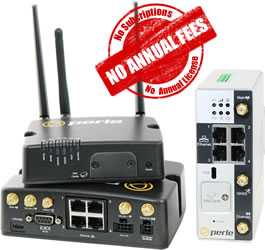
5 Key Benefits of Choosing an Enterprise 5G Router
By Julie McDanielVice President Marketing
May 6, 2025
The adoption of 5G technology stems from the need for faster, more reliable connectivity capable of supporting the increasing data demands of modern operations.
By choosing a 5G router, companies can achieve better connectivity, higher data throughput, and reduced latency. Moreover, this choice leads to improved operational efficiency, real-time data processing, and the ability to support many more connected devices.
1. Enhanced Connectivity and Reliability
Industrial 5G routers set a new standard for connectivity and reliability in challenging environments. Best-in-class 5G routers support a wide array of cellular bands, ensuring worldwide operability across 5G NR with seamless fallback to 4G CAT20 LTE and 3G networks. This, in turn, maintains consistent, reliable connections — particularly in remote or hard-to-reach industrial settings where wired options are either impractical or unavailable.
With built-in out-of-band management, these routers allow for remote troubleshooting, which significantly minimizes downtime by reducing the need for on-site visits. Cloud-hosting further enhances this by enabling the deployment and management of network configurations from anywhere, offering real-time visibility and control over remote operations.
Global cellular band operation, remote management capabilities, rugged construction, and wide operating temperature ranges make industrial cellular routers capable of providing the enhanced connectivity and reliability that modern industrial operations require to function optimally. This reduces the cost of downtime and facilitates faster response to issues as they arise.
2. High-Speed Data Transmission
5G technology offers downlink speeds reaching 4.5Gbps and uplink speeds up to 660Mbps. Practically, this means an industrial facility can transmit high-definition video feeds, large machine data files, and other bandwidth-intensive data in real-time. This is necessary for applications requiring immediate data analysis and action, such as predictive maintenance on manufacturing equipment, where timely data analysis can prevent costly downtime, or remote control and automation of robotics, facilitating immediate adjustments to enhance production efficiency and safety.
3. Lower Latency for Real-Time Operations
5G technology reduces latency to as low as 1 millisecond, over 4G's average latency of 50 milliseconds. This reduction is necessary for industrial automation and control systems where minor delays can impact the operation's effectiveness and safety.
4. Increased Bandwidth
5G technology enhances bandwidth, facilitating the simultaneous connection of numerous IoT devices without compromising performance. The enhanced bandwidth supports data aggregation from these devices, enabling more complex and comprehensive analytics and machine learning applications — helping facilitate more intelligent and autonomous industrial operations.
5. Improved Security Features for Industrial Data
Perle’s 5G routers incorporate enhanced security features tailored to address the intricate requirements of industrial environments These include an integrated zone-based policy firewall that safeguards internal networks from unauthorized access as well as 2 Factor Authentication (2FA).
Additionally, these routers support the creation of segregated virtual networks, each tailored with specific security protocols for various applications. This allows industrial control systems to be isolated from standard IT traffic, thereby reducing the disproportional risk of cyber-attacks within the industrial sector.
Choosing an Industrial 5G Router: Key Considerations
When choosing an industrial 5G router, account for the following to ensure the technology meets your particular industrial requirements.
Compatibility and integration: Choose a 5G router that supports a wide range of cellular bands for seamless integration into existing networks and across different regions around the world. Also, make sure it is compatible with various interfaces, whether Ethernet, USB, RS232, RS485, or multiple I/0 options. Moreover, advanced routing protocols and support for both IPv4 and IPv6 enable smooth integration with current network architectures.
Durability and reliability: Consider a router that’s built to withstand harsh industrial conditions, meeting relevant industrial standards and certifications — such as IP ratings for ingress protection and MIL-STD for shock and vibration resistance.
Scalability: Look for features such as cloud-based centralized management, allowing for easy deployment, management, and scaling of your network infrastructure from a single application.
Security: Look for a router that offers an integrated zone-based policy firewall, intrusion prevention, 2-factor authentication, and remote authentication (RADIUS, TACACS+, LDAP) management. Encryption technologies like OpenVPN & IPsec VPN and advanced encryption standards (AES) also ensure data privacy. Moreover, the ability to control and manage updates securely, with software image CRC control to protect against unwanted corruption and malware, further enhances security.
Perle: Maximizing Your Operational Efficiency with 5G
Perle's IRG7000 5G Routers meet the rigorous demands of industrial environments, providing a robust, secure, and scalable networking solution.
With the added advantage of no ongoing subscription or licensing fees, Perle IRG Routers contribute to cost-effective scalability and management of an industrial network infrastructure.



